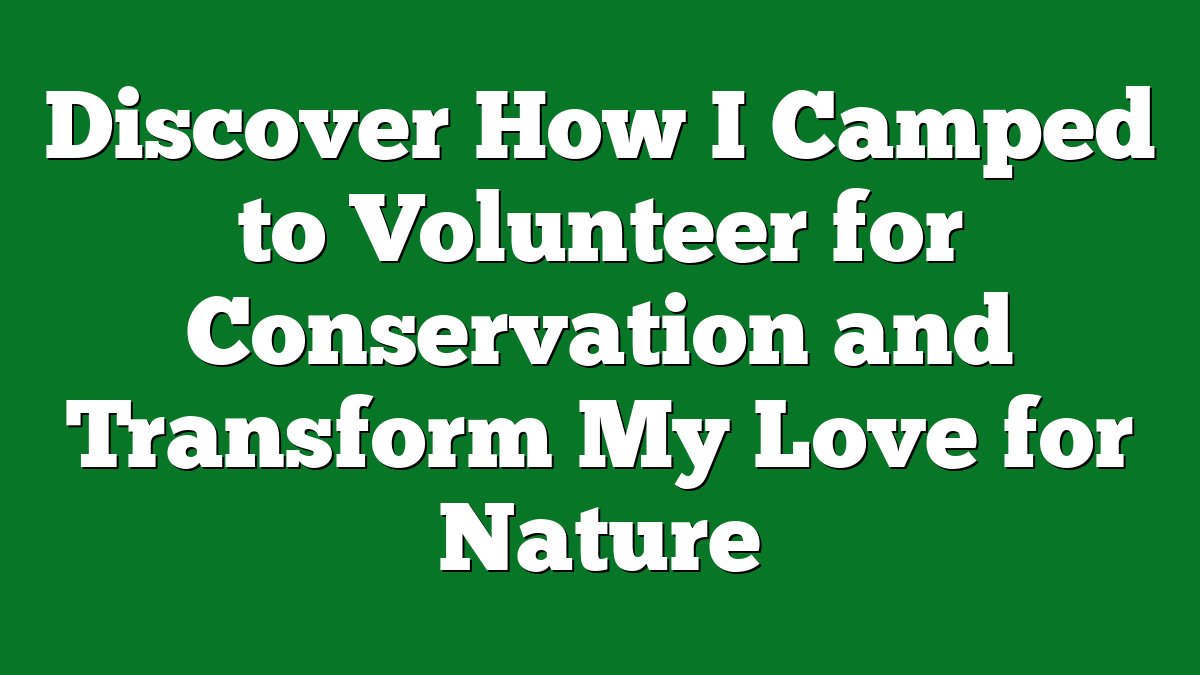Camping has always been a passion of mine, but it took on a whole new meaning when I decided to volunteer for conservation. The thrill of sleeping under the stars while making a difference in the environment was an experience I couldn’t resist. It’s amazing how nature can inspire us to give back, and my journey into the wild was just the beginning.
As I packed my gear and set off for the great outdoors, I felt a mix of excitement and purpose. I knew I’d be working alongside like-minded individuals who shared my love for the planet. From planting trees to cleaning up trails, every moment spent in nature deepened my appreciation for its beauty and fragility. Join me as I share my adventures and the lessons I learned while camping for a cause that truly matters.
How I Camped to Volunteer for Conservation
Camping to volunteer for conservation combines my love for the outdoors with my commitment to the environment. I sought opportunities that allowed me to contribute while experiencing the beauty of nature.
I often chose remote locations where I could immerse myself in the wilderness. Setting up my tent required strategic planning to ensure I’m in safe, practical spots. I selected established campgrounds or designated sites to minimize my impact and adhere to conservation guidelines.
I engaged in various activities during these volunteering trips. Planting trees became one of my favorite tasks, as each young sapling represented a new chance for growth. I often worked for hours, digging holes and carefully placing the roots, knowing my efforts contribute to a larger mission. Cleaning trails stood out too. It felt rewarding to clear debris, making paths accessible for others while protecting wildlife habitats.
During my time volunteering, I also connected with fellow campers who shared my passion. We exchanged tips on camping gear and survival skills around the campfire after a long day of work. I cherished these moments, reflecting on why we camped – not only for personal enjoyment but also for the stewardship of our planet.
Camping as a conservation volunteer nurtured my appreciation for nature’s fragility. Each experience taught me valuable lessons in perseverance and responsibility. These moments deepen my connection to the Earth while allowing me to give back in meaningful ways.
Choosing the Right Conservation Project
Finding the right conservation project enhances the camping experience and strengthens my commitment to preserving nature. It’s essential to consider various factors to ensure a fulfilling volunteer opportunity.
Researching Opportunities
I start by exploring different organizations focused on conservation. Websites like Volunteer.gov and local nonprofit pages provide extensive lists of projects. I examine the specific goals of each project to align with my interests, such as habitat restoration or wildlife protection. Social media groups and forums also offer insights into others’ experiences. Reading reviews helps me gauge the effectiveness and organization of the projects.
Evaluating the Impact
I evaluate projects based on their potential impact on the environment. The most significant projects often address urgent conservation needs. I look for programs that track measurable outcomes, like the number of trees planted or species populations restored. Understanding the broader ecological context of the project adds depth to my commitment. By assessing the long-term sustainability of the project, I ensure my efforts contribute meaningfully to nature, reflecting my passion for preserving the wilderness I love.
Preparing for the Camping Experience
Preparing for camping is key to ensuring an enjoyable and successful trip while volunteering for conservation. Thoughtful planning enhances my experience and helps me connect deeply with the environment.
Packing Essentials
Packing the right gear makes a significant difference. I always include a sturdy tent, a reliable sleeping bag rated for the weather conditions, and a sleeping pad for comfort. Waterproof clothing is a must, along with functional footwear like hiking boots. I also pack a first aid kit, insect repellent, a multi-tool, and a portable stove for cooking. Don’t forget a refillable water bottle and a water purifier to stay hydrated. Snacks like trail mix and energy bars fuel my activities. Additionally, I take along my journal to document my experiences and reflections in nature.
Safety and Health Considerations
Safety and health play crucial roles in outdoor pursuits. Before heading out, I always check weather forecasts and prepare for unanticipated changes. I share my itinerary with someone who’ll stay behind and know where I plan to camp. Keeping a first aid kit nearby ensures I’m ready for minor injuries. Staying aware of local wildlife helps me avoid encounters, while knowledge of basic survival techniques boosts confidence in the wild. Good hygiene practices, like handwashing and cooking food properly, help prevent illness. Regular breaks during activities help me maintain energy and focus, ensuring a safe and enjoyable time while I contribute to conservation efforts.
My Volunteer Experience
Camping to volunteer for conservation has brought me immense joy and fulfillment. Engaging in outdoor work alongside nature enthusiasts strengthens my connection to the environment. This experience allows me to contribute positively to the wild spaces I love.
Daily Activities
Daily tasks during my volunteering trips varied but consistently involved hands-on work that provided immense satisfaction. I spent mornings planting trees, ensuring proper spacing and species selection for a healthier ecosystem. I often found myself clearing trails in the afternoons, making them accessible for future visitors. On certain days, I monitored wildlife habitats and documented observations, contributing data crucial for ongoing conservation efforts. Evening gatherings with fellow campers fostered camaraderie, where we shared stories and tips about camping gear and survival skills. Each day felt like a step toward nurturing the beauty of nature.
Challenges Faced
Volunteering in remote locations offered several challenges that tested my resilience and adaptability. Weather changes frequently affected our plans; rain or heat could transform a day’s work into a struggle. Carrying heavy tools and equipment over rugged terrain often exhausted me, requiring mental and physical stamina. Additionally, encounters with wildlife, while thrilling, sometimes created precarious situations that called for cautious actions. Limited access to resources like fresh water or reliable cell reception added stress but taught me valuable survival skills. These challenges ultimately enhanced my appreciation for the environment and the importance of conservation work.
Reflections on the Journey
Camping to volunteer for conservation offered me invaluable insights and experiences. I embraced challenges, discovered new skills, and deepened my connection to nature.
Lessons Learned
I learned to appreciate the delicate balance between humanity and nature during these experiences. Each day spent planting trees or cleaning trails reinforced the significance of stewardship. I became skilled at setting up camp with minimal environmental impact, adhering to Leave No Trace principles, and understanding local ecosystems. I also developed teamwork skills through collaboration with fellow volunteers, sharing knowledge about native plants and wildlife. The hands-on approach to conservation taught me about the urgent needs of specific habitats and how my efforts contributed to long-term sustainability. Observing the results of our labor instilled a sense of pride in our collective achievements.
Impact on Personal Growth
My journey through conservation volunteering significantly shaped my personal growth. I recognized the resilience required to face unpredictable conditions, from sudden downpours to rigorous hiking trails. Each challenge I overcame built my self-confidence, reinforcing my ability to adapt and persevere. I also forged lasting friendships with like-minded individuals, strengthening my sense of community among outdoor enthusiasts. These connections provided a network of support and inspiration, prompting me to set new goals for my outdoor pursuits. Ultimately, volunteering instilled a deeper respect for the environment and a commitment to preserving it for future generations.
Conclusion
Volunteering for conservation while camping has truly transformed my outlook on nature and my role in preserving it. Each experience has deepened my connection to the environment and taught me invaluable lessons about resilience and responsibility.
The friendships I’ve formed with fellow volunteers are a reminder that we’re all in this together, working towards a common goal of stewardship for our planet. I’m excited to continue this journey and share my adventures with others who care about making a difference.
If you’re considering a similar path, I encourage you to dive in. You might just find that it’s one of the most rewarding experiences you’ll ever have.











